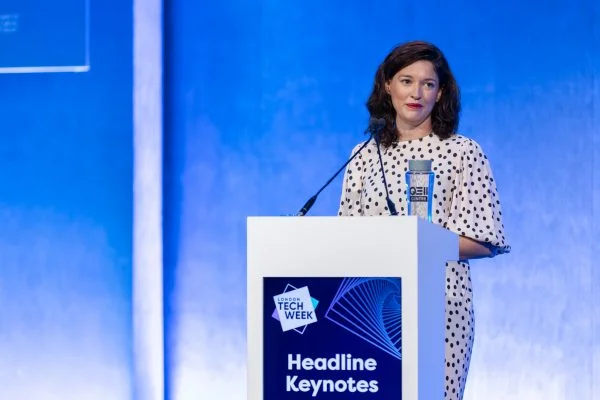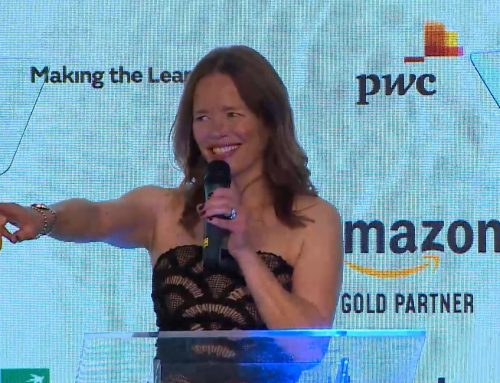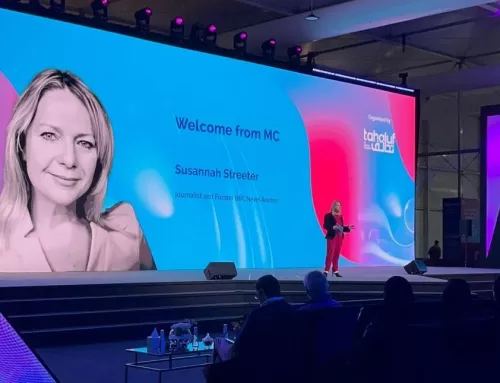Business speakers are shaping boardrooms and conferences everywhere, sharing insights from technology to finance that change the way teams think. Forget the outdated image of a speaker just repeating motivational catchphrases. Research from McKinsey shows effective external speakers can spark important internal conversations and drive real strategic shifts throughout entire organisations.
Table of Contents
- Defining The Role Of Business Speakers
- The Importance Of Effective Business Communication
- How Business Speakers Influence Corporate Culture
- Key Skills And Attributes Of Successful Business Speakers
- Real-World Impact Of Business Speakers On Events And Teams
Quick Summary
| Takeaway | Explanation |
| Business speakers drive organisational transformation. | They act as catalysts for change, encouraging innovative thinking and breaking down communication barriers within teams. |
| Effective communication enhances organisational performance. | Strong communication frameworks lead to higher productivity and employee engagement according to research findings. |
| Speakers translate complex insights into actionable knowledge. | By sharing industry experiences, business speakers help organisations navigate challenges and adopt new strategic directions. |
| Emotional engagement is key to influence. | Business speakers use storytelling to connect with audiences, inspiring motivation and challenging existing mental models. |
| Diverse expertise enriches corporate perspectives. | Business speakers from various backgrounds introduce new ideas, aiding organisations in addressing complex, contemporary challenges effectively. |
Defining the Role of Business Speakers
Business speakers are professional communicators who share strategic insights, industry expertise, and transformative knowledge across corporate environments. Their primary function extends beyond mere presentation, serving as critical conduits of information, inspiration, and strategic direction for organisations.
Professional Communication and Knowledge Transfer
At their core, business speakers translate complex professional experiences into digestible narratives that educate, motivate, and provoke critical thinking. Distinguished speakers like Zoe Kleinman from technology journalism exemplify how personal expertise can illuminate broader industry trends and challenges. These professionals draw from rich career backgrounds, transforming personal journeys into universal lessons about leadership, innovation, and organisational growth.
Strategic Impact and Organisational Learning
Business speakers play a nuanced role in organisational development. According to research from McKinsey, effective external speakers can catalyse internal conversations about strategy, culture, and transformation. Their contributions go far beyond traditional keynote addresses, functioning as:
- Provocateurs of new thinking
- Bridges between theoretical concepts and practical implementation
- Inspirational models of professional achievement
Diverse Professional Domains
The spectrum of business speaking encompasses multiple professional domains. Speakers like Katie Prescott, Susannah Streeter, and Emma Vardy represent diverse sectors including technology, finance, media, and sustainability. Their collective expertise demonstrates how business speakers provide nuanced perspectives that help organisations navigate complex contemporary challenges.
Through strategic communication, these professionals transform raw information into actionable knowledge, bridging gaps between institutional understanding and emerging global trends.
The Importance of Effective Business Communication
Business communication serves as the fundamental infrastructure through which organisations translate strategic vision, collaborate across teams, and drive collective performance. It transcends simple information exchange, representing a complex ecosystem of verbal, written, and digital interactions that shape organisational culture and operational effectiveness.
Communication as Strategic Infrastructure
Effective communication functions as an organisation’s nervous system, enabling rapid transmission of insights, decisions, and collaborative intelligence. Our guide on understanding business speakers highlights how strategic communicators transform complex messages into compelling narratives. According to research from Harvard Business Review, organisations with robust communication frameworks demonstrate significantly higher productivity and employee engagement levels.
Multidimensional Communication Dynamics
Business communication operates across multiple interconnected dimensions, requiring sophisticated skills and adaptive approaches. Successful communication encompasses:
- Clear and precise messaging
- Active listening and interpretative capabilities
- Emotional intelligence and contextual understanding
- Cross-cultural and cross-generational adaptability
- Technological literacy and digital communication proficiency
Technological and Human Integration
Contemporary business communication represents a sophisticated blend of technological platforms and human interaction. Digital tools like video conferencing, collaborative software, and real-time messaging platforms have revolutionised how professionals connect, share knowledge, and coordinate complex projects. Speakers such as Georgia Lewis Anderson demonstrate how technological fluency combined with human narrative skills can transform communication strategies.
Ultimately, effective business communication is not about transmitting information but creating meaningful connections that drive organisational innovation, collaboration, and strategic alignment.
How Business Speakers Influence Corporate Culture
Business speakers are powerful agents of cultural transformation, acting as external catalysts that challenge existing organisational paradigms and inspire fundamental shifts in workplace thinking. Their strategic interventions extend far beyond traditional motivational approaches, serving as profound mechanisms for cultural recalibration and strategic reimagination.
Cultural Narrative and Perspective Shifting
Explore the world of corporate event speakers who bring transformative external perspectives into insular corporate environments. According to MIT Sloan Management Review, external voices can disrupt entrenched thinking patterns and introduce breakthrough conceptual frameworks. Speakers like Emma Vardy and Zoe Kleinman exemplify how personal narratives can challenge institutional assumptions and provoke critical self-reflection among organisational members.
Psychological and Motivational Mechanisms
Business speakers influence corporate culture through sophisticated psychological mechanisms that transcend simple information transmission. Their impact manifests through:
- Emotional engagement and inspirational storytelling
- Challenging existing mental models
- Providing concrete examples of breakthrough thinking
- Creating aspirational reference points for professional development
- Normalising complex change management processes
Strategic Cultural Engineering
Speakers function as external change architects, introducing nuanced strategies for cultural evolution. By sharing experiences from diverse industries, they help organisations understand transformational leadership beyond theoretical constructs. Speakers such as Susannah Streeter demonstrate how personal professional journeys can illuminate broader systemic challenges and potential organisational adaptation strategies.
Ultimately, business speakers do not merely communicate information but fundamentally redesign cognitive landscapes, enabling organisations to perceive challenges and opportunities through more expansive, innovative lenses.
Key Skills and Attributes of Successful Business Speakers
Successful business speakers represent a sophisticated blend of intellectual depth, communication mastery, and emotional intelligence. Their professional effectiveness emerges from a complex interplay of skills that transform raw knowledge into compelling, transformative narratives that resonate across diverse organisational contexts.
Intellectual and Communication Foundations
Explore expert business speakers in London who demonstrate exceptional communication capabilities. According to research from Oxford University’s Said Business School, outstanding business speakers possess a unique combination of analytical thinking and narrative craftsmanship. Professional communicators like Katie Prescott and Georgia Lewis Anderson exemplify how intellectual rigour can be translated into engaging, accessible presentations.
Core Competency Spectrum
The skill set of successful business speakers encompasses a multidimensional competency framework that extends beyond traditional public speaking techniques. Their professional toolkit includes:
- Advanced narrative construction skills
- Deep subject matter expertise
- Adaptive presentation methodologies
- Sophisticated emotional intelligence
- Cross-cultural communication proficiency
- Technological integration capabilities
Psychological and Strategic Dimensions
Business speakers function as strategic communication architects, leveraging psychological insights to create transformative audience experiences. Their ability to read organisational dynamics, understand complex human motivations, and deliver nuanced messages distinguishes them from conventional presenters. Speakers like Emma Vardy demonstrate how personal authenticity, combined with strategic communication techniques, can create profound organisational impact.
Ultimately, successful business speakers are not merely information conduits but sophisticated change agents who use communication as a strategic instrument for organisational transformation and individual inspiration.
The following table provides a concise overview of the core skills and attributes required for successful business speakers, enabling readers to quickly compare intellectual, communicative, and strategic competencies.
| Skill/Attribute | Description |
| Analytical Thinking | Ability to translate complex insights into accessible narratives and actionable knowledge. |
| Communication Mastery | Skilled at clear, engaging verbal and written exchange, tailored to diverse organisational contexts. |
| Emotional Intelligence | Reads and adapts to audience dynamics; connects through authentic storytelling and empathy. |
| Subject Matter Expertise | Brings deep knowledge from fields such as technology, finance, or media to inform business insights. |
| Narrative Construction | Crafts compelling presentations using advanced storytelling and structure. |
| Technological Fluency | Integrates digital tools and platforms to enhance delivery and reach. |
| Cross-Cultural Communication | Adapts messages for audiences from varied backgrounds and industries. |
| Strategic Perspective | Aligns messaging with broader organisational goals and catalyses transformational change. |
Real-World Impact of Business Speakers on Events and Teams
Business speakers represent far more than inspirational presenters, functioning as strategic catalysts that fundamentally transform organisational dynamics, team performance, and collective strategic thinking. Their interventions create measurable ripple effects that extend well beyond the immediate event environment.
Performance and Motivation Dynamics
Discover the power of business event speakers who drive tangible organisational change. According to research from ResearchGate, professional speakers can significantly enhance employee motivation, engagement, and performance through carefully crafted narratives and strategic insights. Speakers like Susannah Streeter and Katie Prescott demonstrate how personal professional journeys can inspire systemic organisational transformation.
Multidimensional Organisational Impact
The influence of business speakers manifests across multiple interconnected organisational dimensions:
- Stimulating innovative thinking patterns
- Breaking down internal communication barriers
- Providing external perspectives on industry challenges
- Normalising change management processes
- Creating shared language and conceptual frameworks
- Enhancing team psychological safety
Strategic Knowledge Transfer
Business speakers function as crucial knowledge bridges, translating complex industry insights into actionable strategies. By sharing experiences from diverse professional landscapes, they help organisations understand emerging trends, technological shifts, and leadership paradigms. Speakers such as Emma Vardy and Zoe Kleinman illustrate how personal expertise can illuminate broader systemic challenges and potential organisational adaptation strategies.
Ultimately, business speakers do not merely communicate information but fundamentally redesign organisational cognitive landscapes, enabling teams to perceive challenges and opportunities through more expansive, innovative perspectives.
This table summarises the primary ways in which business speakers impact organisations, making it easier to see at a glance the scope and depth of their influence on teams and events.
| Area of Impact | Explanation |
| Performance & Motivation | Inspires higher engagement and drive amongst employees through meaningful narratives and real-world achievements. |
| Organisational Culture | Acts as a catalyst for cultural evolution by introducing new perspectives and challenging established thinking. |
| Knowledge Transfer | Converts industry expertise into practical strategies relevant to the organisation’s current and future challenges. |
| Communication Enhancement | Breaks down barriers, promotes clarity, and creates a shared language across teams and hierarchies. |
| Change Management | Normalises and facilitates the adoption of new processes, thought models, and organisational directions. |
| Innovation Stimulation | Sparks new ideas and encourages creative problem-solving beyond traditional boundaries. |
| Team Cohesion | Fosters psychological safety and shared understanding, improving collaboration and mutual support. |
Find the Perfect Business Speaker to Inspire and Transform Your Event
Are you struggling to engage your teams or spark innovative thinking within your organisation? After exploring how professional business speakers shape strategy, motivate teams, and redefine organisational culture, it is clear that the right presenter is vital for transforming events from routine to extraordinary. Every event deserves a voice that brings credibility, actionable insights, and genuine inspiration. At Riva Media, we connect you with acclaimed speakers who translate industry knowledge into dynamic, memorable experiences. From business experts in London to technology thought leaders and media personalities, our curated roster ensures your event features voices trusted for clarity and real impact.
Ready to elevate your next conference or internal event? Visit https://rivamedia.co.uk and explore detailed profiles to secure a speaker who aligns perfectly with your goals. Do not let your next gathering miss its potential to engage, educate, and ignite transformation. Book your ideal speaker today and let Riva Media turn vision into reality.
Frequently Asked Questions
What is the primary role of a business speaker?
Business speakers serve as professional communicators who share strategic insights and industry expertise, facilitating knowledge transfer and inspiring organisational change.
How do business speakers influence corporate culture?
Business speakers act as external catalysts for cultural transformation, challenging existing paradigms and inspiring new thinking through personal narratives and motivational techniques.
What skills are essential for successful business speakers?
Successful business speakers possess a blend of communication mastery, emotional intelligence, deep subject matter expertise, and advanced narrative construction skills, allowing them to create impactful presentations.
How do business speakers contribute to organisational learning?
They help bridge gaps between theoretical concepts and practical implementation, stimulating discussions on strategy, innovation, and growth, ultimately enhancing organisational performance.
Recommended
- Business Speakers
- Understanding How to Book Business Speakers for Events – Riva Media
- Business Speakers London | Expert Insights
- Business Speakers London – Inspiring Leadership & Success
- Understanding Blogging for Business: A Key to Growth
- Understanding the Role of Social Media in Modern Business – Jarrod Harman






